Important Puppy Development Stages – Week By Week
I have bred quite a few litters of puppies over the years, and it’s such a privilege to watch them grow and develop. It’s also a lot of fun for me to record the puppies’ progress as they find their legs and voices, and their characters and personalities appear.
Today I share some of my fox red puppies with you. From those early newborn days right up until they are ready to leave for their new homes at 8 weeks old . We’ll also talk about how puppies grow and develop after they join their new families and follow their progress up to six months of age
Different breeds mature at different rates. So a large dog like a Labrador won’t develop at the same speed as a small breed like a Yorkshire Terrier. But those first weeks of puppy development are very similar whatever the breed, and these landmarks are good general rules for any dog.
Puppy development week by week, changes quickly. So, whether you’re a breeder, or just someone who will be bringing home a new puppy soon, there’s a lot to learn.
Newborn Puppies
Newborn puppies are born at the end of nine weeks of pregnancy, with their eyes and ears tightly closed. They already have a fur coat but they cannot yet control their own body temperature. They are dependent on their mother or another heat source to keep them warm. Newborn puppies may cry if cold. But they do not have the strength to cry for long.
My Labrador Bella was delighted when she gave birth to the lovely puppies pictured below, and spent the first two weeks staying very close to them, nursing them frequently.
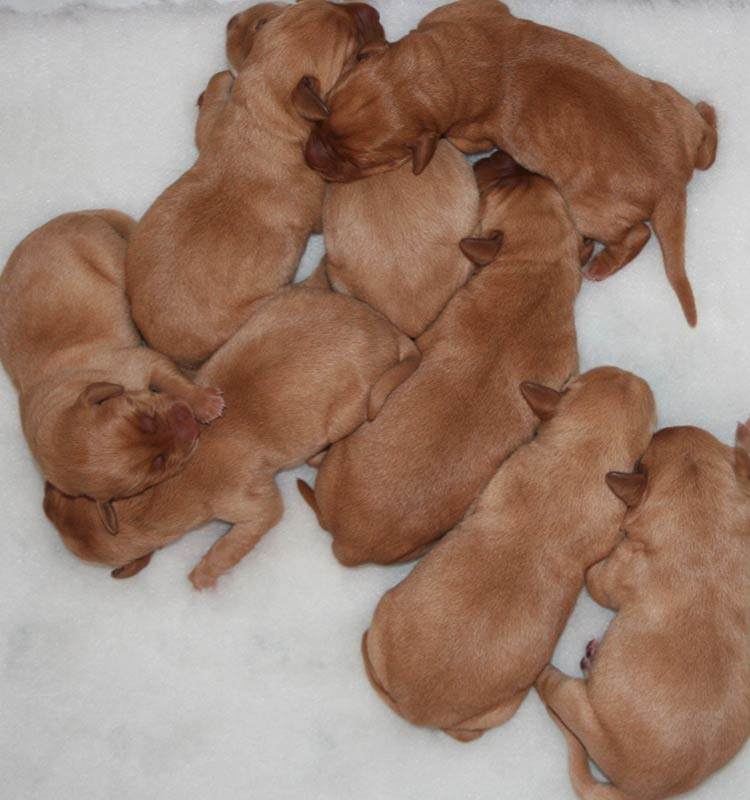
How Helpless are Newborn Pups?
Although they rely on mom for a lot at this stage, newborn puppies are not completely helpless. They can use their front feet to drag themselves towards a heat source or their milk supply.
Newborn pups have no teeth yet. But they can move their heads about to search for a nipple, and they can latch on and suck strongly. Their mother leaves them only to eat, drink and for bathroom purposes. While she is away, the puppies will crawl together to preserve their body heat, as you can see in the photo above.
They may also crawl under a heat lamp source to keep warm. In every other respect newborn puppies are completely dependent on the care of their mother.
Newborn pups have little control over the rear end of their bodies. The mother dog washes them and licks their bottoms to encourage elimination, licking up and swallowing anything they produce to keep her babies and their nest scrupulously clean.
1 Week Old Puppies
Your puppy will grow rapidly during his first week to ten days. In fact, he may even double his birth weight! He’ll look plumper and stronger too. And his face will look just a little more ‘dog’ like, as you can see below.
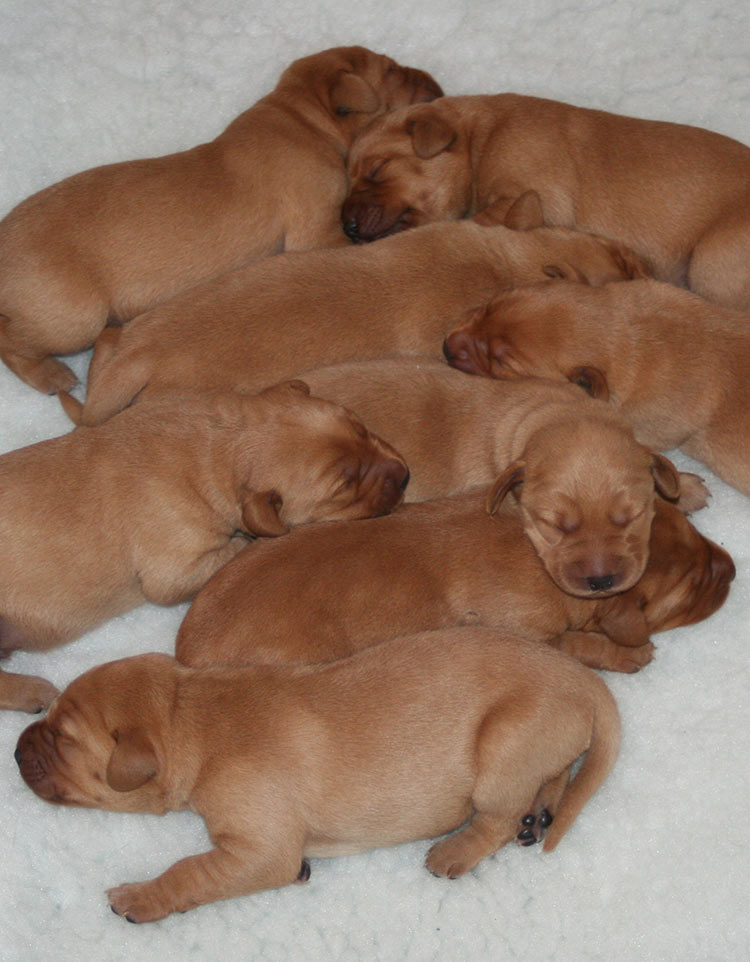
A puppy’s eyes don’t open suddenly, it is a gradual process. And usually begins during the second week of life.
2 Week Old Puppies
Some big changes have taken place during the last week of puppy development stages. 2 week old puppies will often have their eyes fully open, or at least partly open. Ears open at this point too, so your puppy will begin to hear. My Labrador puppies in this picture are two weeks olds.
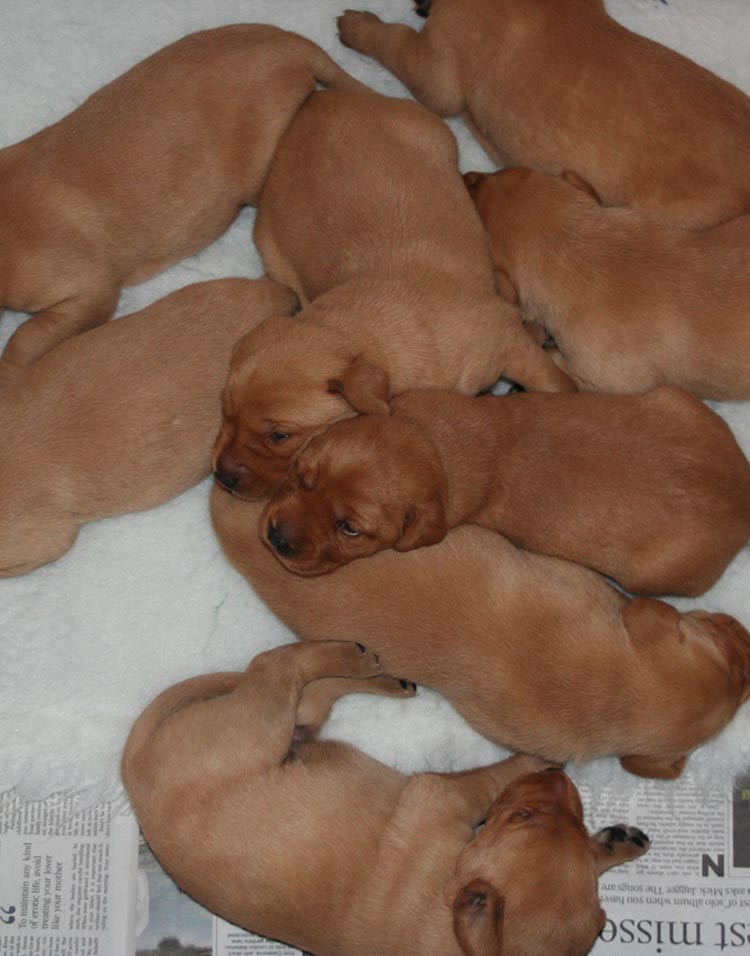
You can see that their eyes are now open and the puppies are beginning to look a little more dog-like. I will be handling the puppies more from now on. It’s an exciting puppy development stage! And like most breeders, I worm my puppies for the first time at two weeks old.
3 Week Old Puppies
The last week has brought a dramatic change in strength and mobility. The puppies’ rear legs start to catch up with the front.
Most 3 week old puppies can stand and sit, and are beginning to totter about. They are also starting to develop their individuality. No longer are they just a row of identical little fat furry sausages!
This little three week old puppy :-
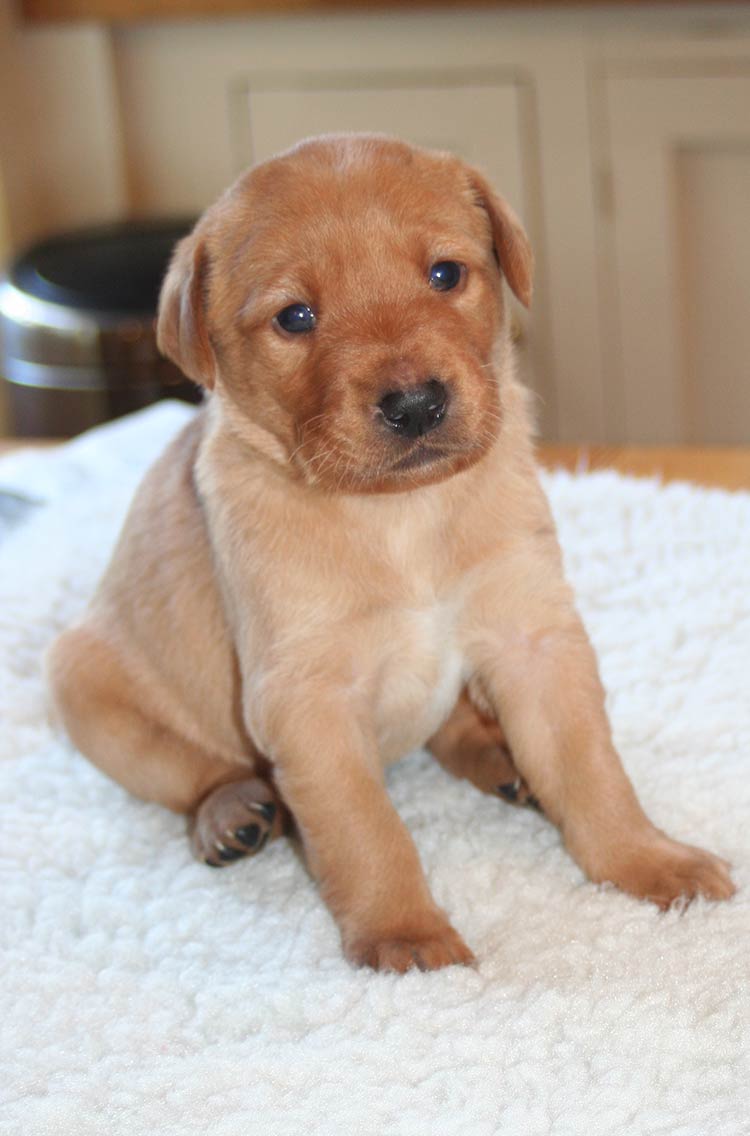
Can easily be distinguished from his brother:
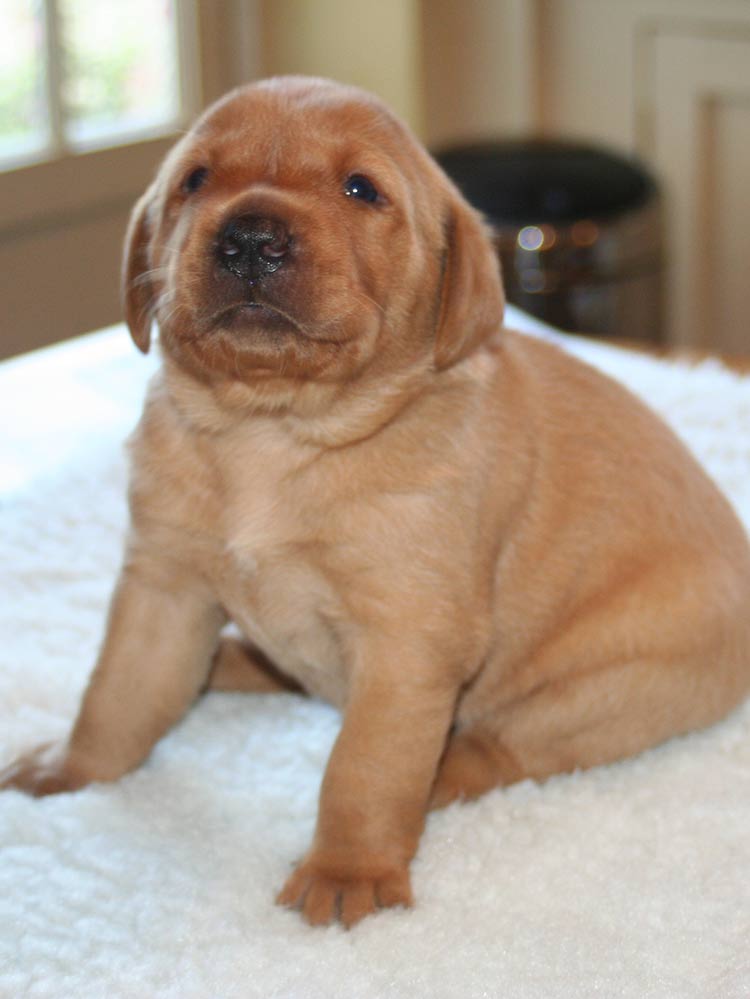
Teething and Further Development
At 3 weeks old, this is also the point at which puppies start teething – cutting their first deciduous baby teeth. Obviously the teeth are appearing for a reason! Some breeders will start to offer the first tastes of solid food at this point. Especially if the litter is a large one and putting a strain on the mother dog.
I love watching a litter of 3 week old puppies beginning to interact with their brothers and sisters. This is when play begins and when I start to hear my puppies give little play growls at one another.
4 Week Old Puppies
4 week old puppies my puppies are looking much more doggy than they did a week ago. They are running, playing enthusiastically, and have started to wag their little tails.
The puppies will start to show bowel control as they move away from the other puppies to defecate. And solid food is becoming a major part of their diet.
These little pups are tucking into some puppy food. Though the little guy in front doesn’t seem too impressed!
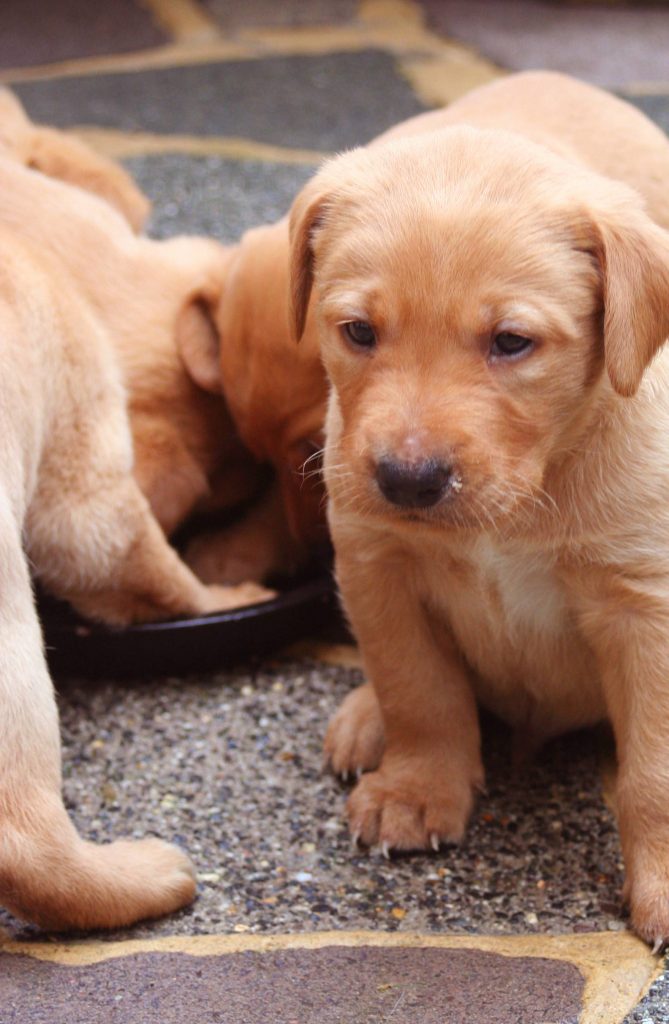
If the weather is warm enough, my puppies spend some time outdoors now. Mealtimes are a messy process, so feeding puppies out in the yard can be a good idea.
Breeder Involvement
Some mother dogs will lose interest in cleaning up after their pups at this point or soon afterwards. Keeping things clean and sweet smelling now becomes the breeder’s responsibility. And many puppies will be wormed again this week.
Vocalizations are becoming stronger at this puppy development stage. The litter will greet their mother noisily when she returns to them, and try hard to follow her out of the whelping box whenever she leaves.
5 Week Old Puppy
By five weeks old, the mother dog is spending more of her time away from her puppies. The puppies themselves are now eating solid food several times a day and gradually being weaned of their dependency on her milk.
Puppies will still suckle ravenously when their mother returns and she will now often feed them standing up and only for a short time. She will also be teaching the puppies not to bite too hard.
This is a key point in the development of the puppies’ relationships with people. So, I make sure that my puppies spend time with humans and learning to be familiar with the sounds and sights of a human family environment.
Puppies being raised in kennels must be brought into a home environment regularly from now on to ensure they develop into confident, friendly dogs.
6 Week Old Puppy
6 week old puppy dogs are fully weaned and eating five or six small meals of solid food each day. A 6 week old puppy doesn’t depend on his mother’s milk any more but he does need her help and guidance.
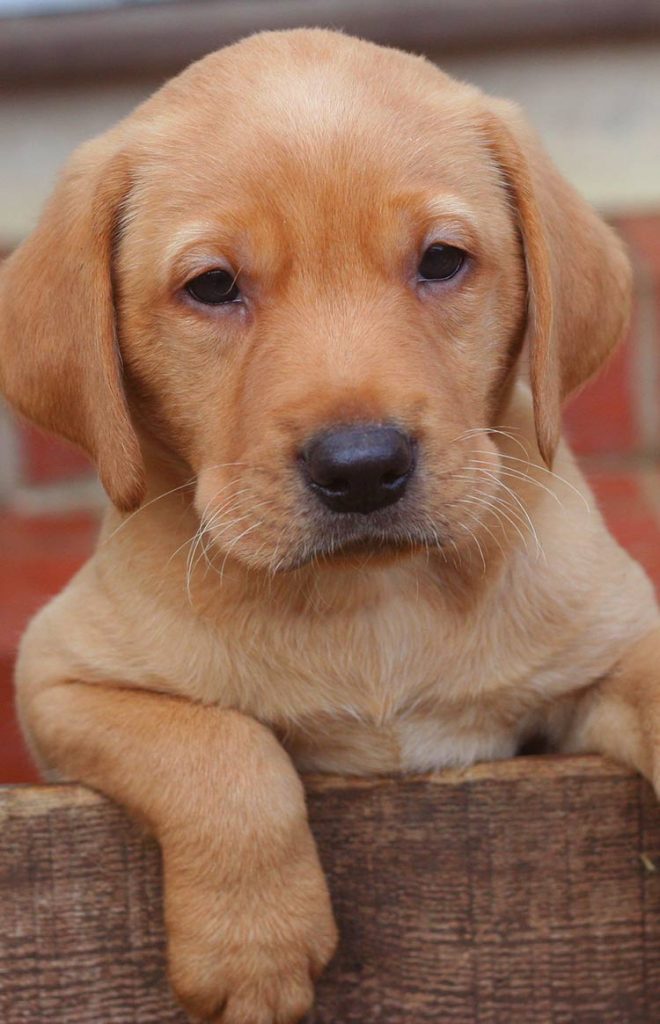
Puppies Still Have a Lot to Learn at 6 Weeks
In some countries, puppies are taken to their new homes at this age. But this is not a good idea, and can result in a puppy that has poor bite inhibition and is challenging to manage.
The puppies are learning not to bite too hard from the reactions of their mother and siblings. Six week old puppies need this important interaction and won’t be ready to leave home for another couple of weeks.
Growth is not quite so fast now. But the puppies will still grow strongly for the next few months. Many puppies will be wormed again this week.
7 Week Old Puppies
The 7th week, for most puppies, is the final one with their brothers and sisters. All that remains is for plenty of great socialization experiences to be packed into this week, with final checks on health.
Many breeders will arrange for each seven week old puppy to have a vet check this week. Some puppies are also given their first vaccinations at this visit, before they leave for their new homes. My vet advises against early vaccination as many puppies still have maternal antibodies, which can interfere with the vaccines effectiveness.
Some breeders will now have the puppies trained to pee and poop on puppy pads or newspaper. And like me, some will have been whistling to the puppies at meal times to get them used to coming to a human signal.
8 Week Old Puppy
For most puppies, this is the first week in their new home. Potty training is now underway and puppy socialization plans are being made.
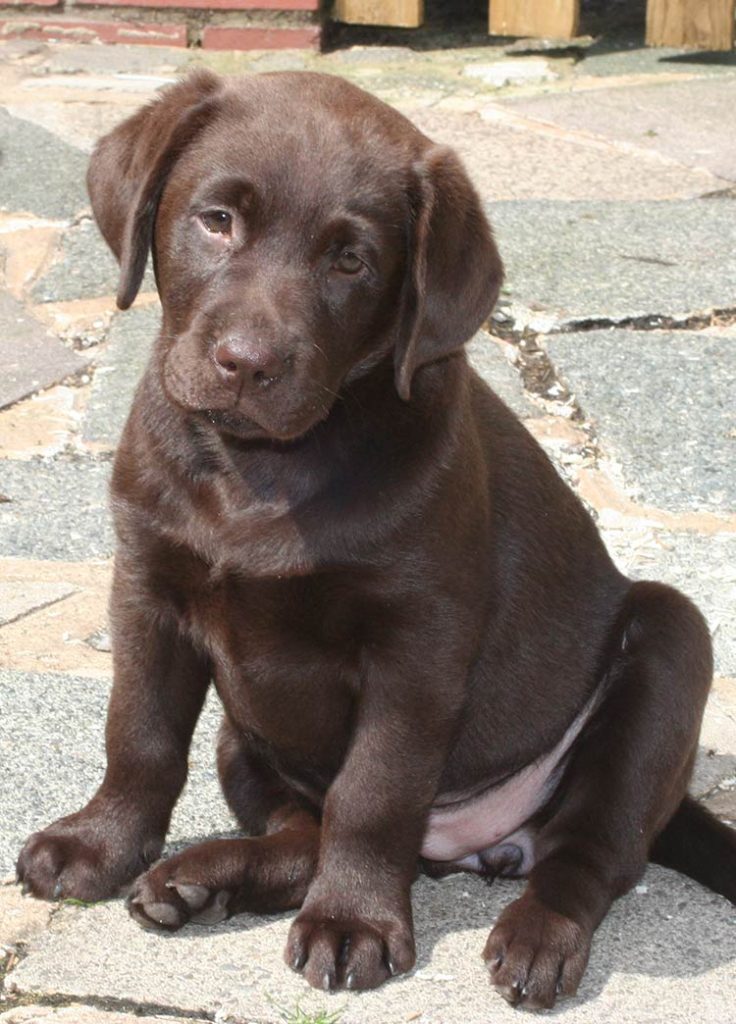
If your 8 week old puppy didn’t have their first vaccination before you collected them you need to arrange this in the first day or two. It’s a good idea to get them checked over by your vet in any case, and I always recommend new puppy parents get their new arrival checked over by their own vet within the first few days of arrival.
9 Week Old Puppy
The nine week old puppy has usually been in his new home for a week or so. He’s beginning to feel like part of the family, but in many cases this is the point at which new puppy owners have a whole lot of questions to ask. At this point, many of you will be thinking about training your puppy too.
The next four weeks are vital in puppy development stages. Your main job is socializing your puppy. This means taking him to lots of new places and exposing him to lots of new experiences. In most places you’ll need to carry him to avoid the risk of infection.
10 Week Old Puppy
At 10 and 11 weeks old, your puppy will be able to control their bladder a lot more, potentially up to 6 hours through the night. So, life will be starting to get back to normal.
Most puppies in the U.S. receive vaccinations between 10 and 12 weeks old. So, make sure you’re up to date with your puppy’s vaccination schedule. In the U.K. this second shot can happen anywhere between 9 and 13 weeks old. So, not all puppies will get their vaccinations at the exact same age.
Socializing your puppy is still the most important job for you at this age. But, you cannot put your puppy on the ground outside until they have received their final vaccination.
So, make sure you know exactly when their final jab is. And carry on introducing them to as many new people, things, and experiences as possible throughout this puppy development stage.
Some people can suffer from the puppy blues at this stage too, as your life has completely changed!
3 Month Old Puppy
3 months is the point at which the window for socializing your puppy – making sure he grows up confident and friendly – closes. But, that does not mean socialization can stop. Puppies who are isolated at this point will soon lose that friendly fearlessness.
You have an important job now, building on what has been achieved so far, and introducing your puppy to the world at ground level. This part of his education can begin once his vaccination cover is complete. He should be fully immunised at around this point. But check with your vet for confirmation of the actual date.
Three months also marks the point at which many puppies will drop down from four daily meals, to three. This can cause problems for some puppies because the portions are larger
If your puppy gets an upset tummy when you make this change, just go back up to four meals again for a few days, and give smaller portions for a few days when you try again.
4 Month Old Puppy
Some 4 month old puppies will be potty trained. But, many will need another month before they can cope without frequent bathroom breaks and the occasional accident.
Your puppy will begin to lose his baby teeth. This can also be a time at which biting can be most challenging. So, you’ll need to be consistent patient. And try not to worry, this stage will soon be over!
5 Month Old Puppy
Many five month old puppies will be fairly reliably clean and dry in the house, provided that they are not left alone for too long. A few will need another month or two to complete the process.
Remember, no two puppies are the same. Puppies progress at different rates, so don’t worry if your puppy does need those extra few weeks to hit a milestone like this.
Medium to large puppies like Labradors will already be half their adult height or more, and your puppy’s coat will now be a sleek grown up version. That puppy fluffiness will have gone.
For many puppies, five months is an awkward, gangly time. A five month old puppy may have shed the last of his soft puppy lines and be looking quite skinny.
Getting Stronger
Your puppy is getting stronger now too, and if you haven’t done so already, now is a good time to make sure he learns how to walk nicely on the leash.
In a month or two, he’ll be a lot harder to control if he is still pulling.
6 Month Old Puppy
At six months most puppies drop down from three meals a day to two. By the end of this month most puppies will have finished teething but an urge to chew may continue for another few months in some breeds, Labradors included.
Some female dogs will have their first season during this month. But, for many, it will be another three or four months before this happens. Be aware though, if you haven’t had your female dog neutered, that the possibility of pregnancy is on the horizon.
This is a major milestone for your puppy. He is now looking very much like an adult Labrador. A little smaller, a little more puppyish, but he’s nearly there.
Still a Puppy
Because he looks quite grown up, people expect a lot of their 6 month old puppy. But inside, he is still very much a puppy. The beginnings of adolescence and with it an increasing independence of spirit can bring its challenges, but also a whole lot of fun.

Free Labrador Updates!
Get my training tips, news, reviews, and the latest from The Labrador Site delivered to your inbox



My little 5 week old dashhound is eating and growing great, my only issue us I can’t keep him from chewing on stuff, electric cords, paper stuff on my tabled, in the trash can etc
He’s doing well potty training, yet he will still do it on my rugs.
Any advice?
Hi,we are taking our 3month puppy out for potty but he never do outside,he does potty inside house only.please guid me
Meeta, please wait a little longer. My 4 week old can go outside and is understanding to try and wait to go outside.
please guide me . when i have to feed my 13 years old labrador and how ?
You might find this article helpful: https://www.thelabradorsite.com/best-dog-food-for-senior-dogs/
I was very lucky, but didn’t realise it. My puppy was potty trained within two weeks but was afraid to climb the stairs to get to the back yard. I decided to help him and placed little pieces of chicken on each stair. In about 30 minutes, he had lost all his fear. Next thing I noticed, he descended the stairs and ran to the spot I had been carrying him and did his thing. A few little midhaps in the following weeks but nothing serious.